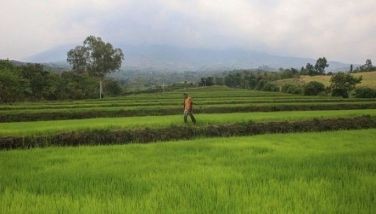SONA focus: Social welfare programs
MANILA, Philippines – President Arroyo’s social welfare programs – conceived in response to skyrocketing prices of fuel and basic goods – are expected to highlight her State of the Nation Address (SONA) on July 28.
“She will talk about the government’s response to the crisis which is felt not only in the Philippines but in other countries as well,” Augusto Santos, director general of the National Economic and Development Authority (NEDA), said in Filipino over radio station dzRB.
In her previous SONAs, Mrs. Arroyo talked about achievements in job generation and infrastructure. But for this year, she is expected to put emphasis on her social programs, particularly the subsidies to the poor.
Santos said the Arroyo administration has already achieved much as far as the infrastructure projects are concerned.
In a separate interview, Presidential Management Staff director general Cerge Remonde said most of the projects mentioned in last year’s SONA were even finished ahead of schedule.
“The priority projects are ahead of schedule and some are already completed,” Remonde said.
He said there were delays in some airport development projects but these are being addressed.
Remonde pointed out that the government now has sufficient funds for these projects and for its social welfare program.
Apart from domestic sources, Remonde said international lending institutions have also committed to help the government. He did not elaborate.
“Now what the government is doing is to see to it that these programs are properly implemented. We are studying, depending on the availability of funds, what else could be done by the government to address the crisis,” Santos said.
Santos maintained that the social programs of the government will not only help the masses cope with the rising prices but will also encourage the private sector to participate in the effort.
“In this manner, economic growth would be sustained,” he said.
Santos said the country’s economic fundamentals continue to remain solid and that growth, as measured by gross domestic product, is still projected to hit a decent 5.7 to 6.6 percent this year.
The government has foregone its plan to balance the budget this year, as it needs to spend more to help the poor.
Earlier, Budget Secretary Rolando Andaya said the government is open to a budget deficit equivalent to one percent of GDP this year.
“We are looking at spending patterns to see what we need now and if they (various departments) can spend the funds,” Andaya said.
“We can expect more rounds of subsidies in the next quarter. At least another P4 billion in the second half,” he added.
Unexpected backer of subsidy
Unlike his opposition colleagues who are against government dole-outs, Cagayan de Oro Rep. Rufus Rodriguez is in favor of President Arroyo’s P500 subsidy for every poor family, and even wants this included in the 2009 national budget.
The neophyte lawmaker, who is reportedly running for senator in the 2010 elections, filed House Resolution 614 requesting the DBM to include the P10-billion Ahon Pamilyang Pinoy program in the 2009 General Appropriations Act.
He said his resolution “intends to minimize the burden of poor families relating to health, nutrition and education.”
The program “would empower poor families to manage their resources wisely and prudently and enable their children to finish basic education,” he said.
The Ahon Pamilyang Pinoy program seeks to benefit 600 households for this year and 20,000 next year.
The Rodriguez resolution also proposes the inclusion of P2 billion in the 2009 budget of the social welfare department for the feeding of poor day-care students nationwide.
“Beneficiaries of this program will be the poorest children who are 0-14 years of age and their parents,” he said.
The opposition congressman said the program provides an initial annual funding of P5 billion for the poor families in the country’s 20 poorest provinces. An annual P6,000 or P500 a month cash grant package will be given per household for health check-ups and vaccines.
At the same time, a P3,000 annual cash grant or P300 a month will be given as an education package per enrolled child, for a maximum of three children beneficiaries per family.
“These programs are more of assistance to the poor, and serve as government’s way of bringing back to the people through more social services the excess revenues it earned from collections,” said Tarlac Rep. Jesi Lapus, brother of Education Secretary Jesli Lapus.
The lawmaker, along with fellow neophyte Rep. Alvin Sandoval of Malabon City-Navotas, debunked claims by some sectors that these are meant to prop up the image of the President.
Lapus said critics were being “unconscionable for harping on the government’s assistance to the poor drawn up to help them cope with the rising prices of fuel and rice.”
“These assistance programs are solid proof of President Arroyo’s deep concern for the poor especially during these hard times,” said Lapus, vice chairman of the House committee on good government and public accountability.
For his part, Sandoval, vice chairman of the House committee on Metro Manila development, said it is every “government’s responsibility to help the poor” and that “providing them with subsidy programs was one way of fulfilling this mandate.”
“Once again, the Arroyo government showed its sensitivity to the plight of the poor by providing immediate relief to them. That’s a laudable move of the government worthy of our support,” he said. – Marvin Sy, Delon Porcalla
- Latest
- Trending






























